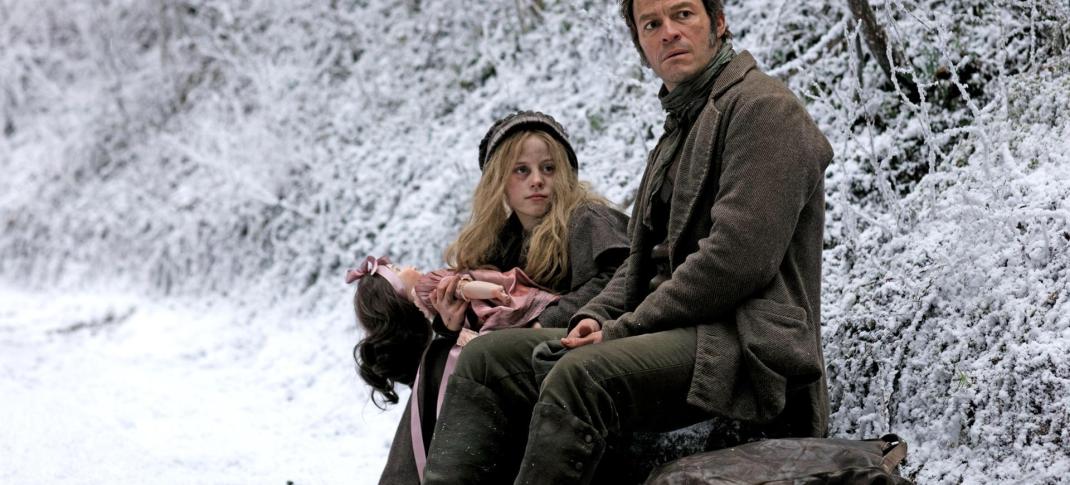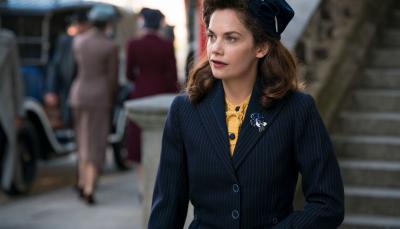'Les Miserables' Episode 3 Recap: Castle on a Cloud

Previously on Les Miserables: Fantine exhibits terrible judgment by leaving her young daughter in the care of the Thenardiers, the trashiest and most selfish couple on Earth, while attempting to earn a living for them both. She ends up working for Valjean, who has somehow reinvented himself as some kind of successful businessman and politician in the six years since we last saw them, but she ultimately loses her job, her hair, and her front teeth, before becoming a sex worker, catching consumption and being forced to physically fight dudes in the street before winding up dying in a hospital. Elsewhere, Javert pops back up to tell the new Monseiur le Mayor that a man claiming to be former convict Jean Val Jean is arrested for robbing a child in a different town. Everything is terrible, basically, because that’s really the sort of story this is. Need more details? Our recap of Episode 2 is here.
The third episode of Les Miserables goes a long way toward humanizing the previously offputting and largely feral Jean Valjean. That it does this through the insertion of a small, charming child into his life is a trope and a half, but since it also means Dominic West gets to both talk to dolls and smile occasionally, it’s easy enough to deal with.
We’ve spent two episodes watching the story of Valjean’s life – his time in prison, his time as a mayor – but we’ve spent precious little time with him. How did he go from one man to the other? How did he internalize the gifts both spiritual and temporal that Monseigneur Muriel gave him? Is he really the man he pretends to be – the kind, giving soul everyone around him claims he is?
Well, for the most part, the answer to that is yes.
Sure, Valjean robbed a child. He indirectly caused Fantine a great deal of pain. You could perhaps argue that he bears some responsibility for her looming death, as her fall from grace is a direct result of the fact that he had a bad day. But this Valjean, perhaps in a way his previous self was not, is ready to accept the consequences of his actions. He saves a man’s life, even though he knows moving the cart will draw suspicion upon him. He confesses to his real identity in court, to prevent an innocent man from going to jail in his name. And he promises to make things right for Fantine’s daughter, Cosette, in the name of all the wrong he caused her mother.
Which, of course, he does. Though perhaps not the way that she might have expected.

Fantine dies in agony this week, as we probably all knew she would. This Les Miserables refuses to whitewash or purify the horror of her death – it looks painful right up until her final breath, as she screams for her child and urges Valjean to keep the promise he made her
Valjean, headed back to prison pretty much as her eyes close, can’t exactly do that – but he doesn’t forget his vow, and two years later rolls up into the Thenardiers’ inn for the most satisfying sequence of the entire series to date.
The thing is, Les Miserables the musical has lulled a lot of us into thinking of the Thenardiers as entertaining comic relief. They get the great “Master of the House” number and while they’re clearly bad people, they’re not outright monsters. Here (as in Hugo’s novel) they are. They beat Cosette, force her to do hard labor, allow their guests to openly mock her and dress her in rags, while their own daughters are well treated. (Poor Gavroche, whom Madame Thenardier tries to literally abandon at one point, fairs equally badly, however.)
Valjean’s arrival, and subsequent exploitation of their blatant greed, is satisfying to watch (though one does wish they weren’t basically getting paid buckets of money to be terrible). Just seeing someone care what happens to this poor little girl – probably for the first time since Fantine left her there – is heartrending. Of course she’d rather go off with a stranger!
Here, more than perhaps in any other adaptation of this story, it is obvious that becoming a father is the saving of Jean Valjean. Undoubtedly this is a great move for Cosette, generally, but Valjean literally seems a new man with someone to look after and, eventually, love.

The third episode ends in a way that’s not so dissimilar from the first – Jean Valjean, lost, alone and with nothing, finds grace and a(nother) second chance with the people of God. This time, fleeing Javert’s men, he and Cosette – who has helpfully passed out from some sudden unnamed malady – take refuge at a house of holy women. This convent happens to contain a nun from his time as a mayor who can vouch for his good heart, but more importantly, another religious figure decides to take a chance on the goodness she believes is in him.
The Mother Superior not only allows Cosette to stay and gives Valjean a job, she lies to Javert for him and throws the authorities off his track. It’s not silver candlesticks, exactly, but it’s another kind of spiritual payment on his behalf, a leap of faith that he is a person worth helping. Worth saving. And it’s earned, this time, because he admits that being apart from his adopted daughter would break his heart. (To love another person is to see the face of God, after all.) How far, indeed we have come.
The one false note in this episode – actually, in this entire series to date – remains Inspector Javert. David Oyelowo is selling Javert’s determined rage well, but the character’s motivation remains a little too murky at times. Why is he so obsessed with Valjean, specifically? Why is this multi-year manhunt worth so much to him? What’s really driving this chase? A lot of takes on this story explain Javert’s overt weirdness on that issue by really driving home his love for the order of the law, that he’s just an OCD-fueled cop gone overboard. That reading doesn’t really jive for me here – so let’s hope Les Mis can make this Javert into something more than the police caricature he seems at the moment.
What did you think of this episode of Les Miserables? Let’s discuss in the comments.




